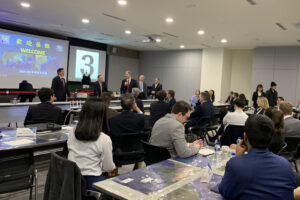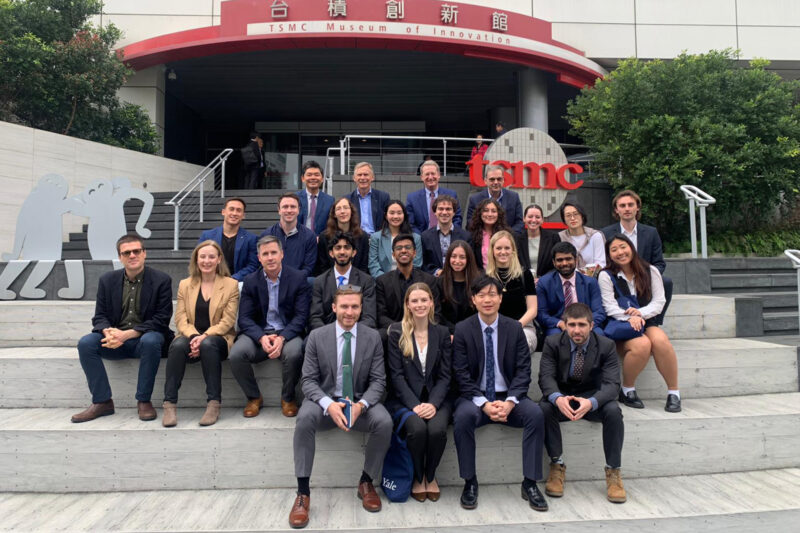A group of 19 students in the Schmidt Program on Artificial Intelligence, Emerging Technologies, and National Power traveled to Taiwan over spring break for a series of high-level discussions focused on AI, emerging technology, and U.S.-China-Taiwan relations. The students and accompanying faculty and fellows represented the Jackson School, Yale Law School, the Yale School of Management, the Yale School of Engineering and Applied Sciences, and Yale College.
Students learned about U.S.-China competition over strategic technologies, Taiwan’s leading role in the critical semiconductor industry, cross-strait relations, and the global contest for advantage in cyberspace and other domains.
Members of the Yale delegation held discussions with Foreign Minister Joseph Wu, Minister of Digital Affairs Audrey Tang, experts from the Taiwan Center from Security Studies (TCSS) and Taiwan AI Labs, and a number of former government officials and party leaders.
In addition, the Yale group visited the city of Hsinchu, a major hub for science and technology development. They met with leaders from Taiwanese tech companies that included Taiwan Semiconductor Manufacturing Company (TSMC), UMC, and MediaTek, as well as the Semiconductor Institute of National Yang Ming Chiao Tung University.
“Our engagement with decision makers in Taiwan across the political, economic, and technological spectrum significantly deepened our understanding of the pivotal issues driving strategic competition today and into the foreseeable future,” said Ted Wittenstein, senior lecturer in global affairs.
“We deeply appreciate the fact that Taiwanese leaders in government, industry, and civil society took the time to hold frank conversations on such important and difficult questions.”

Disinformation and misinformation were the focus of discussions with Tang and Taiwan AI Labs founder Ethan Tu. Tang highlighted the Taiwanese government’s efforts to combat adversarial efforts through a strategy of “prebunking.” As opposed to debunking, “prebunking” is a strategy of anticipating the influence operations of malicious actors and deploying fact- and logic-based narratives in advance. Tu explained how Taiwan AI Labs seeks to detect and reveal a wide range of mis/disinformation attacks on civil discourse.
“The conversation with Minister Tang was extremely valuable regarding digital and AI policy,” said global affairs major Halli Watson ’24. “The ministry’s strategies include ingenious ways of defanging some of the most pernicious attacks from foreign or domestic adversaries online.”
Students also observed a regional security tabletop exercise hosted by TCSS. The exercise simulated eight security scenarios set in the year 2032, with the goal of identifying strategies for averting and managing risk following a hypothetical cross-strait crisis. Event moderator retired Admiral Richard Chen, former vice minister of defense and a current Taiwanese legislator, visited Yale in April 2023 and was instrumental in bringing the Yale delegation to Taiwan.
“The variety of discussions we had in Taiwan was phenomenal,” said Jackson Senior Fellow Andrew Makridis. “From the technical to the political and everything in between, we learned so much from our Taiwanese colleagues. I believe this experience was invaluable for students in the Schmidt Program.”
The trip was part of a year-long Jackson course, “Artificial Intelligence, Emerging Technologies, and National Power.” Working with Wittenstein, the course instructor, students prepared background papers for the Yale delegation leaders in advance, as well as written summaries of their post-trip findings. The student group also traveled to Washington, D.C., in April to present their trip reactions to the Geopolitics of Technology Forum, a gathering of senior officials from the U.S. departments of State, Commerce, and Defense focused on strategic competition in the Indo-Pacific.
Yale students also had the opportunity to meet with peers at the Fairwinds Foundation in Taiwan, a non-profit organization dedicated to dialogue on global trends and youth development.
